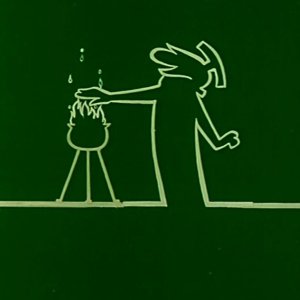some background knowledge needed, otherwise excellent movie about the creation of anime series
[Edit to add a warning if you're photosensitve or are currently suffering from a migraine, the fast pace, the use of lighting and / or the jumpy half-finished aminations seem to have an adverse effect on some people.]
The film dumps you right in the middle of things. I did not understand at all what was happening until about the 35 minutes mark, and even then it took me another 10 to 15 minutes to really get it. I went in cold -- did not even read much more than the tags on the Japanese Film Festival Online 2024 website -- anime, business, drama -- so I had no idea what this film was about.
Several other things that probably did not help was that a) the Japanese names and titles that were shown with each introduction of a new character often were not translated and b) I do not know anything about the anime industry; also, c) it is not clear in the beginning which secondary characters will be important and which will be not, and most of them are introduced rather fast, so I was not able to keep track of them, and tended to mix them up in later scenes, as well as d) the sets for the two studios also look very similar, and e) I didn't know which anime series was which (because we only hear about the plot after about 40 minutes of runtime).
For the story, this is what I think would have helped to know: There are two production studios, who simultaneously make an anime series each -- both series are scheduled to air at the same time, so they will be direct competitors.
"Soundback" is directed by newbie Saito Hitomi (the woman with the glasses) and her producer is Yukishiro Osamu (sleek guy in a suit), it's colour coded as light blue. This is the one with the two sisters and the group of kids from a rural town.
"Liddell Light" is directed by Oji Chiharu who had a huge hit eight years ago (guy with tousled hair) and his producer is Arishina Kayako (woman, usually in business attire), it's colour coded as pink. This one is about a magical girl on a racing bike (or something like that).
So, live action scenes are supplemented by animations from both series (often half-finished) and also by animated scenes where the ratings and reactions from the audience are shown to us (this is where the colour coding comes in).
The main struggle might be between the creativity of the directors and the constraints of the market (an anime has to be commercially successful!). It also might be between the two directors, who compete and try to make the superior anime (which is where the title comes from). The film is much more complex and can't be reduced to just one "message" -- there are other stories below that, so it is worth to look a bit closer -- what seems the main issue in the beginning might not be what's actually important.
As soon as I got the hang of things, the film was excellent. Of course, the acting is incredible, but I was particularly impressed with the camera work and the editing. Fast-paced scenes in cramped and dark spaces are directly followed by slower, even contemplative scenes.
I loved the use of space and light, of static filming and of following moving characters with the camera -- it's quite obvious that a lot of thought has gone into this.
For example: the fast, almost oppressive, mood in the beginning is countered by an equally fast, but uplifting, mood in the last part -- we have the same sets, the same cast, the same time constraints to finish work, but they feel completely opposite, showing and underlining the main characters' state of mind.
Which is why I think some more time would have been good, maybe even as little as fifteen minutes or so, so that I could have been less confused in the beginning. In my opinion it must be possible to understand a film even if you know nothing about it before hand, even if you're not familiar with the subject (i.e. the making of animes in this case).
I also think that I did not get as close to the characters as I want to, there's no real connection there -- some more time would have helped with this too.
One last comment: I love that the male characters don't overshadow the female characters -- they have all their unique focus and their own strong personality. (Dare I even say it? I think both female main characters have a stronger personality than the male characters.)
Overall, I liked it and I learned something new about making anime, so that's a plus.
If you go into the film with the background info I gave above, and maybe a bit of knowledge of the anime industry, then I think you'll enjoy it.
The film dumps you right in the middle of things. I did not understand at all what was happening until about the 35 minutes mark, and even then it took me another 10 to 15 minutes to really get it. I went in cold -- did not even read much more than the tags on the Japanese Film Festival Online 2024 website -- anime, business, drama -- so I had no idea what this film was about.
Several other things that probably did not help was that a) the Japanese names and titles that were shown with each introduction of a new character often were not translated and b) I do not know anything about the anime industry; also, c) it is not clear in the beginning which secondary characters will be important and which will be not, and most of them are introduced rather fast, so I was not able to keep track of them, and tended to mix them up in later scenes, as well as d) the sets for the two studios also look very similar, and e) I didn't know which anime series was which (because we only hear about the plot after about 40 minutes of runtime).
For the story, this is what I think would have helped to know: There are two production studios, who simultaneously make an anime series each -- both series are scheduled to air at the same time, so they will be direct competitors.
"Soundback" is directed by newbie Saito Hitomi (the woman with the glasses) and her producer is Yukishiro Osamu (sleek guy in a suit), it's colour coded as light blue. This is the one with the two sisters and the group of kids from a rural town.
"Liddell Light" is directed by Oji Chiharu who had a huge hit eight years ago (guy with tousled hair) and his producer is Arishina Kayako (woman, usually in business attire), it's colour coded as pink. This one is about a magical girl on a racing bike (or something like that).
So, live action scenes are supplemented by animations from both series (often half-finished) and also by animated scenes where the ratings and reactions from the audience are shown to us (this is where the colour coding comes in).
The main struggle might be between the creativity of the directors and the constraints of the market (an anime has to be commercially successful!). It also might be between the two directors, who compete and try to make the superior anime (which is where the title comes from). The film is much more complex and can't be reduced to just one "message" -- there are other stories below that, so it is worth to look a bit closer -- what seems the main issue in the beginning might not be what's actually important.
As soon as I got the hang of things, the film was excellent. Of course, the acting is incredible, but I was particularly impressed with the camera work and the editing. Fast-paced scenes in cramped and dark spaces are directly followed by slower, even contemplative scenes.
I loved the use of space and light, of static filming and of following moving characters with the camera -- it's quite obvious that a lot of thought has gone into this.
For example: the fast, almost oppressive, mood in the beginning is countered by an equally fast, but uplifting, mood in the last part -- we have the same sets, the same cast, the same time constraints to finish work, but they feel completely opposite, showing and underlining the main characters' state of mind.
Which is why I think some more time would have been good, maybe even as little as fifteen minutes or so, so that I could have been less confused in the beginning. In my opinion it must be possible to understand a film even if you know nothing about it before hand, even if you're not familiar with the subject (i.e. the making of animes in this case).
I also think that I did not get as close to the characters as I want to, there's no real connection there -- some more time would have helped with this too.
One last comment: I love that the male characters don't overshadow the female characters -- they have all their unique focus and their own strong personality. (Dare I even say it? I think both female main characters have a stronger personality than the male characters.)
Overall, I liked it and I learned something new about making anime, so that's a plus.
If you go into the film with the background info I gave above, and maybe a bit of knowledge of the anime industry, then I think you'll enjoy it.
Vond je deze recentie nuttig?


 4
4















